How WCFM Vendors can create a bookable product
↑ Back to topThe Booking and Appointment for WooCommerce plugin can convert any of your Vendor’s products into bookable ones.
Here’s how it can be done.
A. Vendor Settings
↑ Back to topLogin to your WCFM Vendor Dashboard first.
Go to the Booking tab > Create Bookable to create a bookable product.

Booking Tab
It will take you to the Products Page.
Enter the details such as the Name, Product Type, Price, Product Image, etc of your booking product:

Adding a new product
Then, scroll down till you find the ‘Booking’ meta box.
Fill in the details of your online booking services under the ‘General’ menu.
In it, you will first have to enable your booking.
Then, choose what kind of booking type you require. Booking types can be based on the following:
- Only Days: Single Day, or Multiple Nights
- Date & Time: Fixed Time, or Duration-Based Time
- Multiple Dates: Dates, or Dates & Fixed Time
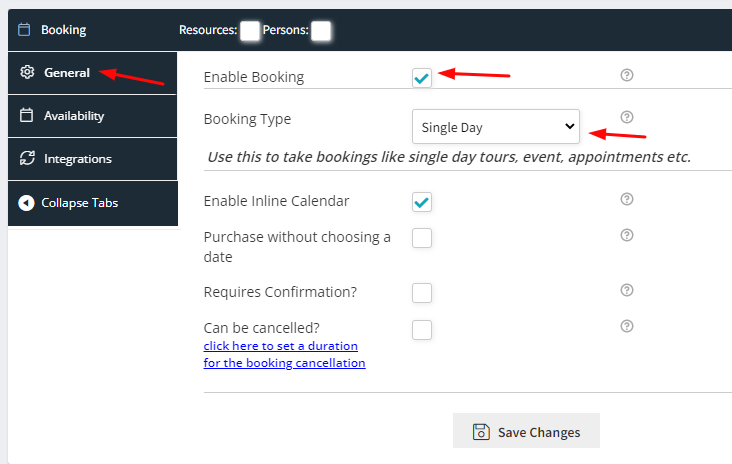
Booking settings
Configure the other settings such as enabling an inline calendar, purchasing without choosing a date, requiring confirmation for the date, etc.
Furthermore, under the ‘Availability’ menu, set the availability of your bookings.
Once you are done, save these settings & click on the ‘Submit’ option!
B. Frontend Display
↑ Back to topLet’s see how this newly created product can be booked.
Under the ‘Store’ tab you will see your bookable product like this:
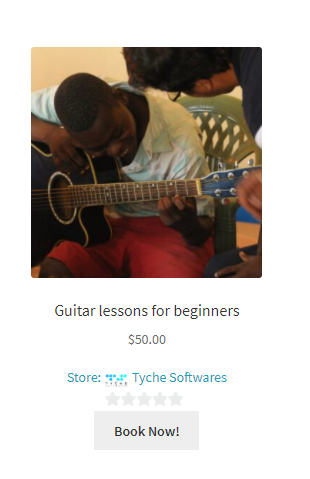
Vendor’s product displayed on the store
After clicking on it, the customer will be taken to the product page:
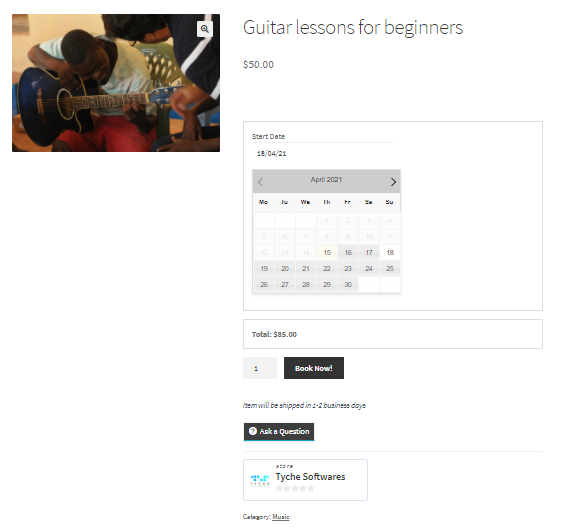
The front end of the newly added product from the vendor’s side
The ‘Guitar lessons for beginners’ is booked for 18th April 2021 at $85.
The customer will be taken to the Cart Page which will appear like this:
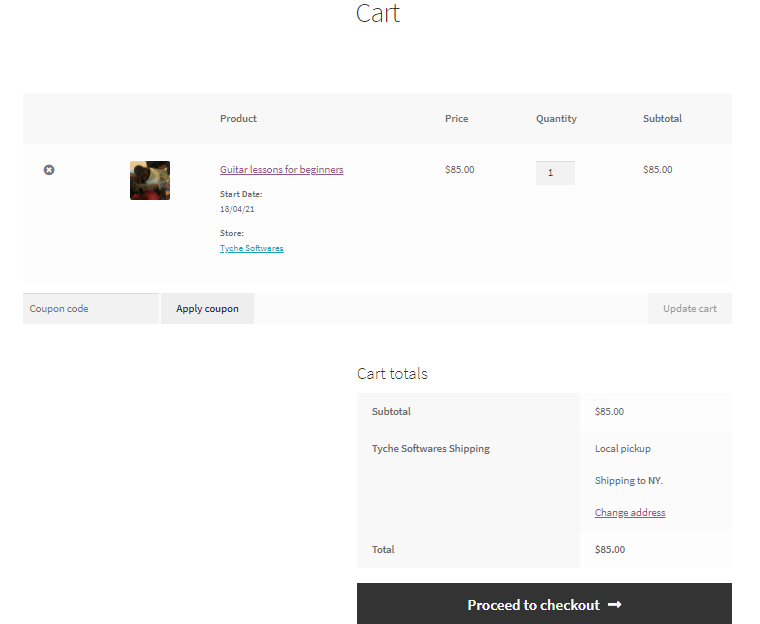
Cart page displaying details of the selected product
After confirming the order details, the ‘Proceed to checkout‘ option can be clicked.
The Checkout Page which will appear as shown below:
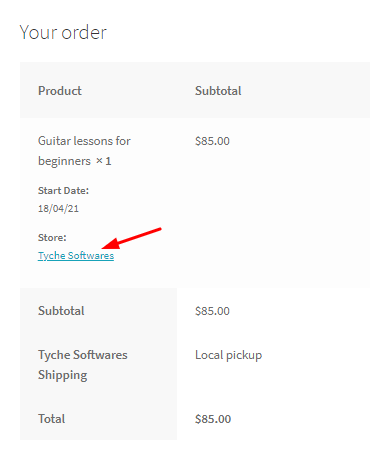
Order Details page showing booking details
Here’s how the Thank you Page will appear:
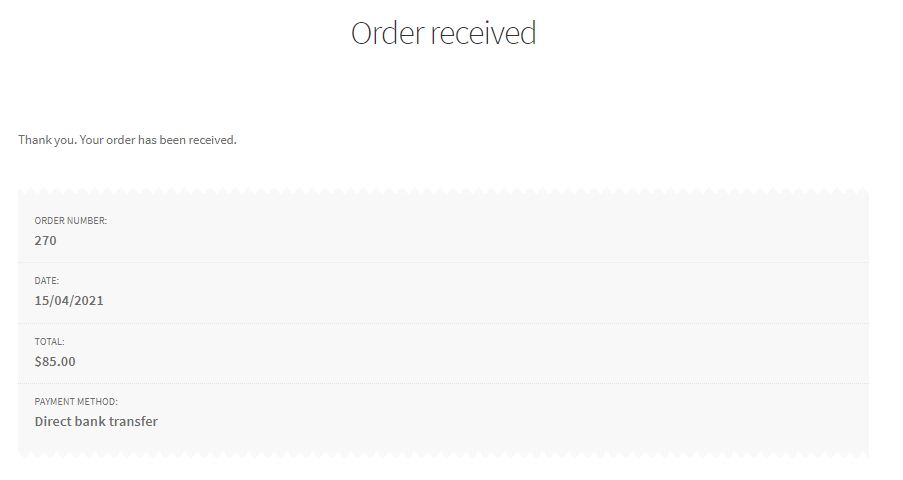
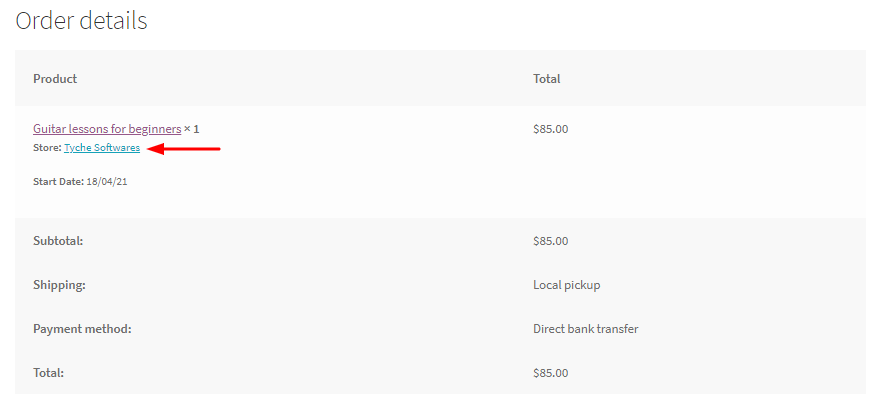
Now, after an order has been booked, if you wish to view it, you can see it under the ‘Order Tab’ of Vendor Dashboard as shown below:
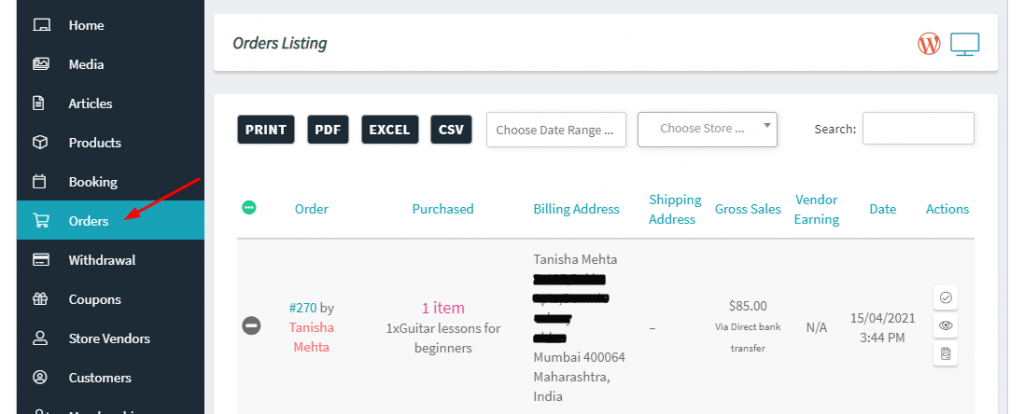
Here, we can see that the order placed is displayed with Order #270 and its details.
If you click on the ‘eye’ icon located on the right-hand side, you will be able to view all the details of this order as such:
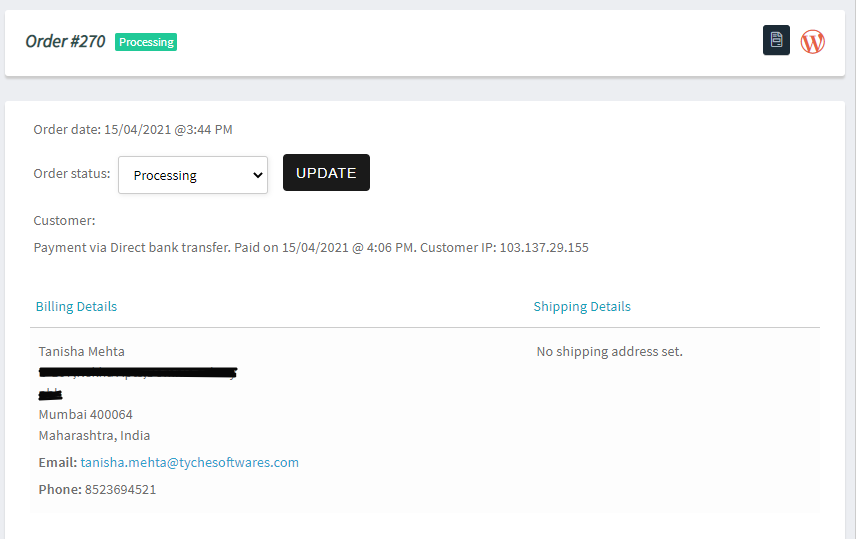
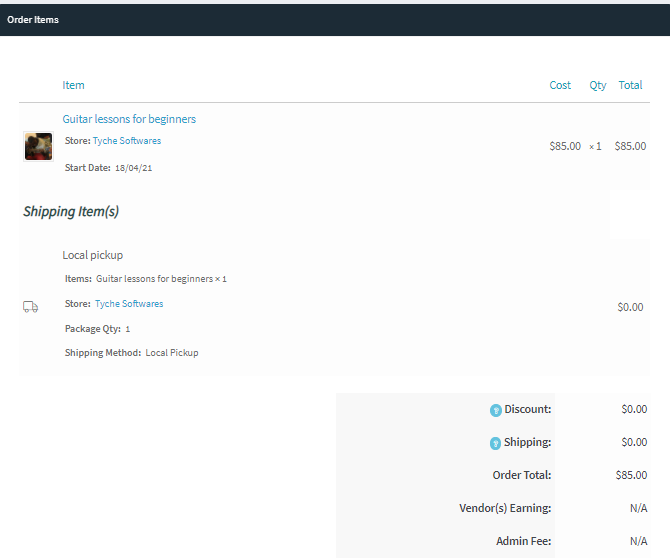
In addition to seeing the booking details in the order, you can check this booking from the “View Bookings” page.
You can also edit your booking date from there. Learn more about it here.
Thus, as a Vendor, you have successfully created a bookable product for your store!
How WCFM Vendors can view booking details
↑ Back to topWith the Booking and Appointment Plugin for WooCommerce, WCFM Vendors can easily check all the necessary information about their bookings in the ‘View Bookings’ section.
To see your bookings, go to Booking > View Bookings.
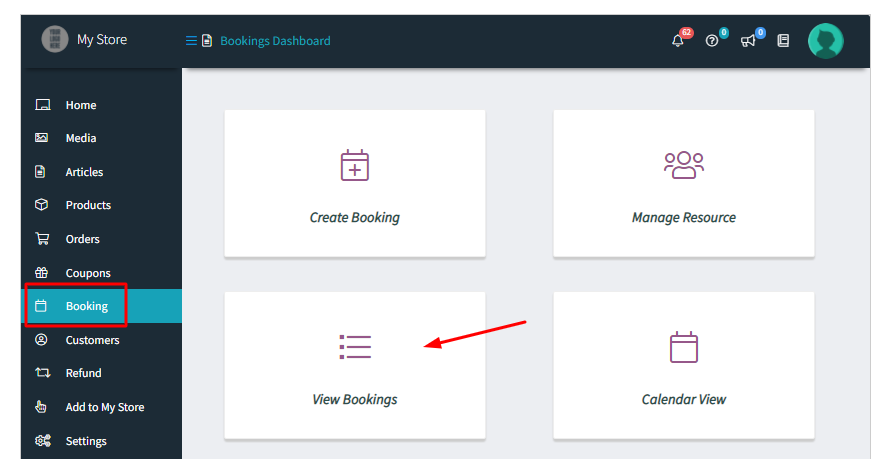
Here’s how all your bookings will appear:


A. Booking Tab
These will be found below the words View Bookings. The tabs will show you all the bookings according to the one selected by you. They are:
- All: This will show all the bookings irrespective of their different statuses.
- Complete: This will show all the bookings that have been completed.
- Paid & Confirmed: It displays all bookings where payment has been completed and the store admin has confirmed the bookings
- Confirmed: This shows all the bookings confirmed by the store admin.
- Pending Confirmation: All the bookings where approval is required from the store admin will be displayed here for the admin to approve or reject the booking request.
- Canceled: It displays all bookings canceled by the customers or the store admin.
B. CSV and Print buttons
↑ Back to topNext, on the top right-hand side corner you will find two buttons:
You can download data of all, searched, and filtered bookings into a CSV file with the click of the CSV button.
As you click on it, a data.csv file is downloaded and all the booking details can be viewed in that CSV file as shown in the image:

The Print button on the All Bookings page to print all, searched, and filtered bookings.
As you click it, a print preview of all/searched/filtered bookings will be generated as shown in the below image.

C. Booking Filters
↑ Back to topFurther ahead, if you wish to filter the bookings then you can do so by using any of the three filters available:

Using this filter, you can view your bookings by selecting your products.
For instance, if you selected the “Music classes” product, you will get the following bookings:

This filter will allow you to see bookings made by a particular customer.
Simply enter the name of your customer to find the bookings that were made by them.
Under this filter, you will find the following options in the dropdown:
- Today Onwards – It displays booking records of current and future dates.
- Today’s Check-ins– It displays all the booking records whose check-in date is today.
- Today’s Check-outs– It displays all the booking records whose check-out date is today.
- Imported Bookings– It displays all the booking records that were imported.
- Custom Dates– It allows you to select a custom date range on the View Bookings page, displaying all bookings made within the selected date range.
For instance, if you choose a custom date range from 10th July 2024 to 26th July 2024, the filtered bookings will appear as such:

D. Booking Table
Now, let’s have a look at all the details that will be available to you for the orders. They are:
- Status- It will show the status (whether the order has been paid, pending, etc) of the product
- Booking ID– It is a unique number of a booking
- Booked Product– Name of service booked by the customer
- Booked By– Customer’s first and last name entered at the checkout form
- Order– It is a unique number of a particular order
- Start Date– This is the start date selected by the customer for the booking service
- End Date– This is the end date selected by the customer for the booking service
- Persons– This shows the number of persons selected for the booking
- Zoom Meeting– This will show in case you have chosen to integrate your bookings with the video calling application Zoom
- Amount– It is the total amount of the order
- Actions– This gives you the following two options:
If you wish to make any changes, click on the ‘pencil’ icon to edit your booking.

You can make your changes to the booking according to your requirements & then click on the ‘Confirm’ option to save it:
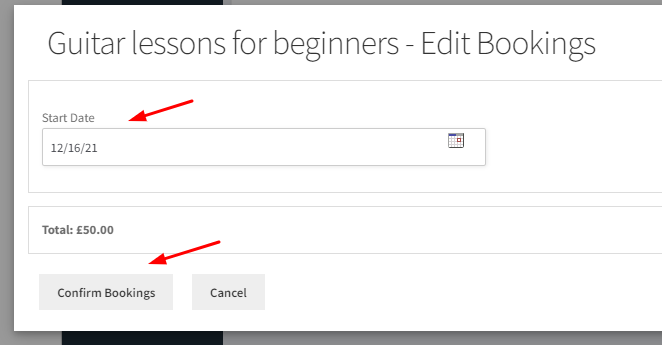
If you wish to cancel the booking, then you can press the X icon as shown below:

In this manner, you can view different details of all your bookings.
How WCFM Vendors can view bookings in the Calendar & set up Holidays
↑ Back to topWCFM Vendors who wish to know about their upcoming bookings can use the Calendar View.
To access it, you will have to go to the Booking tab and click on “Calendar View” as shown below:
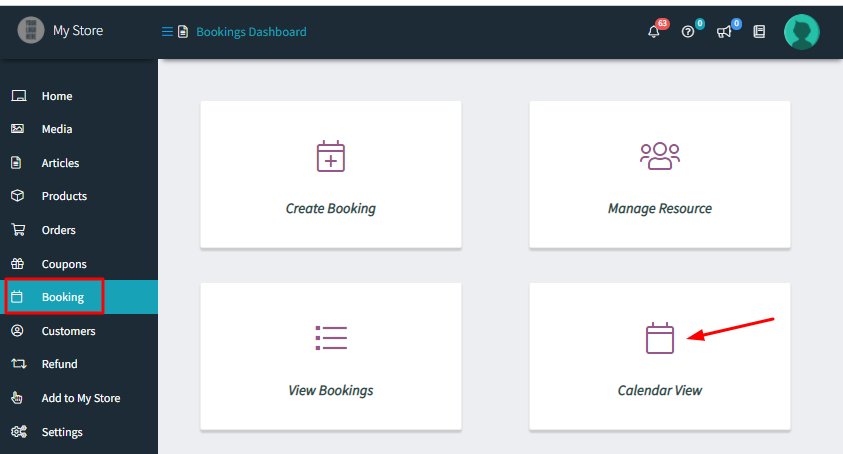
A. Calendar View
↑ Back to topWhen you select it, by default you will be displayed the Week view:
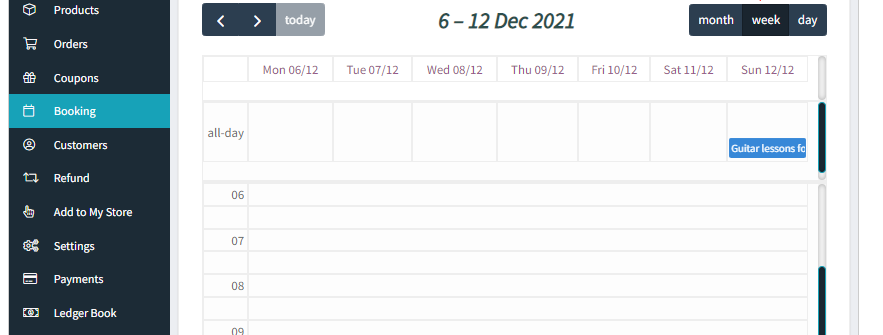
You can view all the bookings in a particular month by switching to Month view:
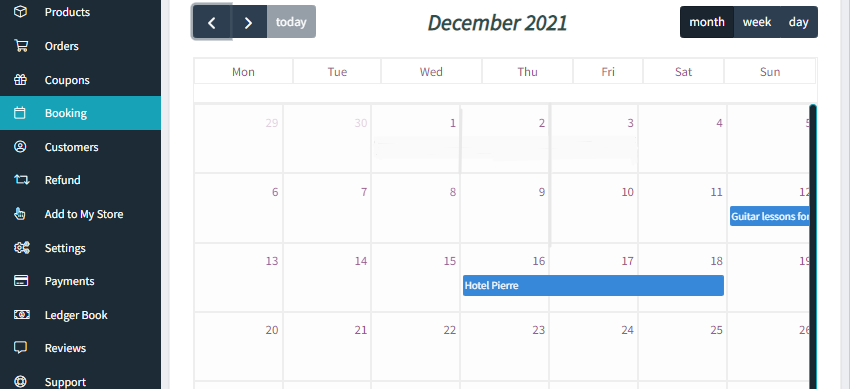
Day view will display all the bookings that are there during the day.
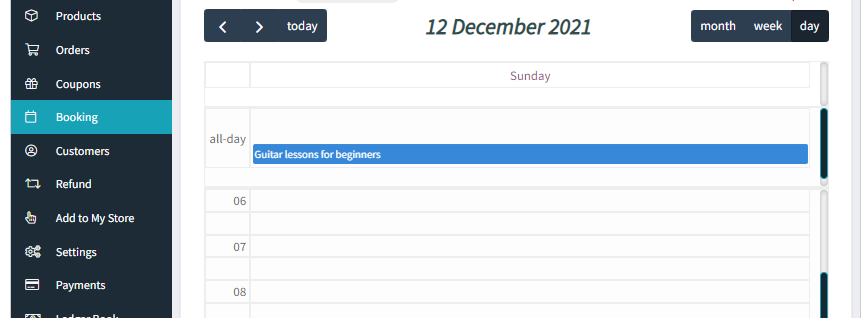
When you click on the booking, then you will be displayed with different details such as Order ID, Product Name, Booking Date and Time, Customer’s name, etc:

B. Setting up Holidays
Now, if a Vendor wishes to set up Holidays, then they can use the ‘Availability’ feature as shown below:

After clicking it, the Vendor will have to give a title to this holiday and add the duration, i.e., start and end date of this period.
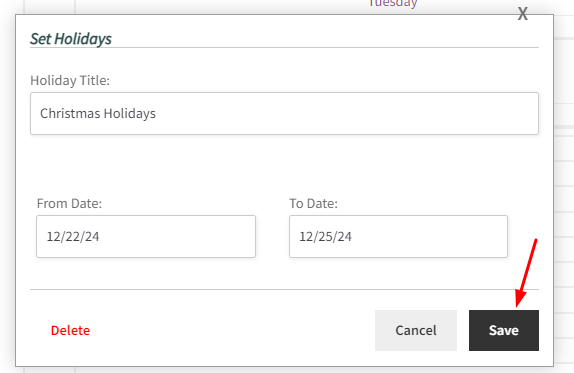
For instance, you want to set up holidays for Christmas.
The title can be “Christmas Holiday” and the dates can be from 22nd December to 25th December 2024.
Click on the ‘Save’ button once done.
You may even delete this holiday once it’s set up. Click the ‘Delete’ button.
After saving it, your Holiday will appear like this on the Calendar:
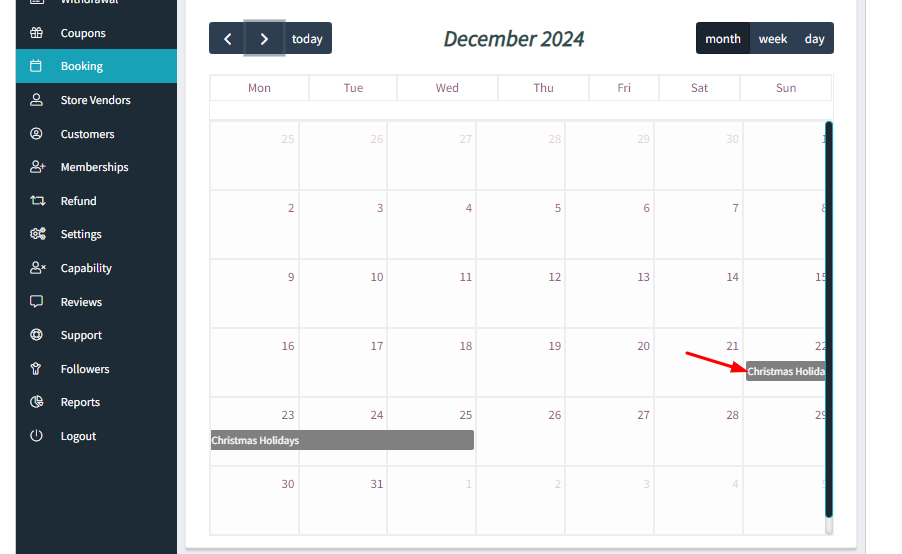
The above one as you can see is the Calendar in Month view.
For Week View, it will appear like this:
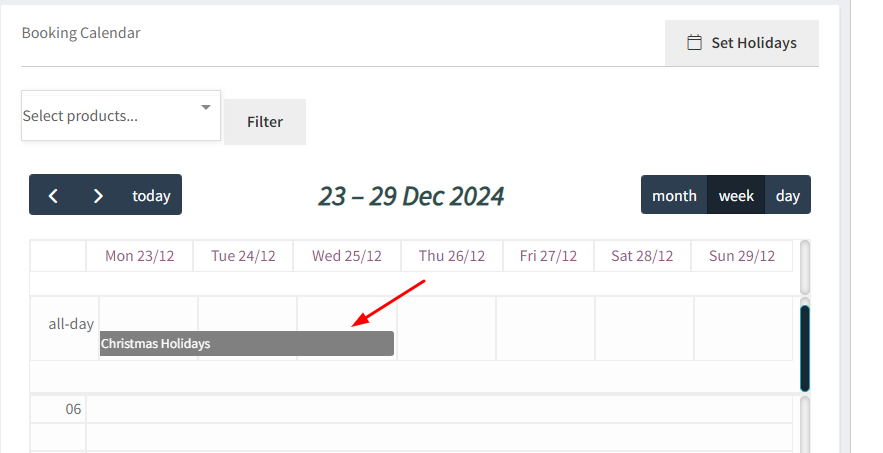
C. Filter Bookings
In the booking Calendar, you will also get the option to view bookings based on the filtered products.
Choose the product and click the Filter button to view those bookins in the calendar.
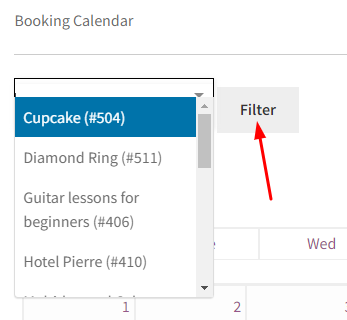
In this way, different vendors of your site can set up holidays for all their products using this feature.
How WCFM Vendors can manage resources
↑ Back to topWith Booking and Appointment Plugin for WooCommerce v5.10.0, WCFM Vendors can easily manage resources for different bookings.
Go to your WCFM Dashboard and find the Booking section.
Click the “Manage Resource” option here:
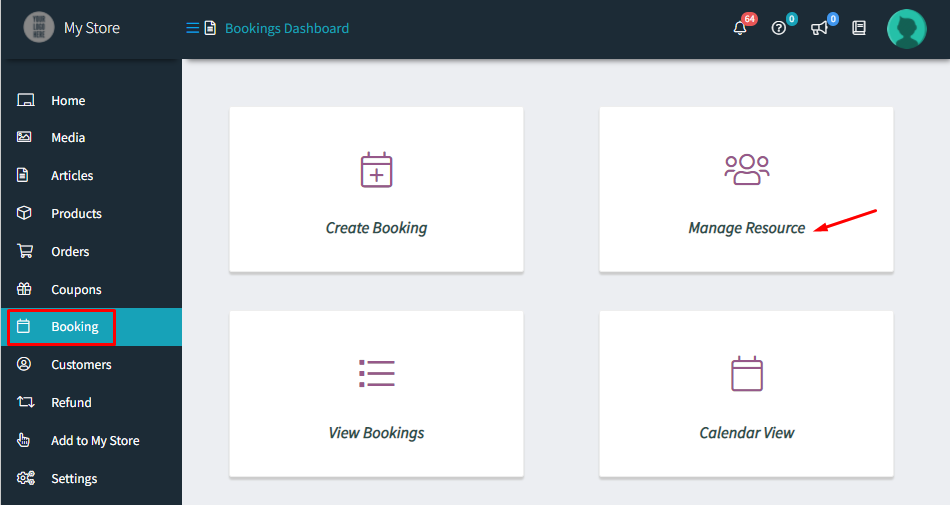
Find the “Add Resource” option and click on it:

It will appear like this:
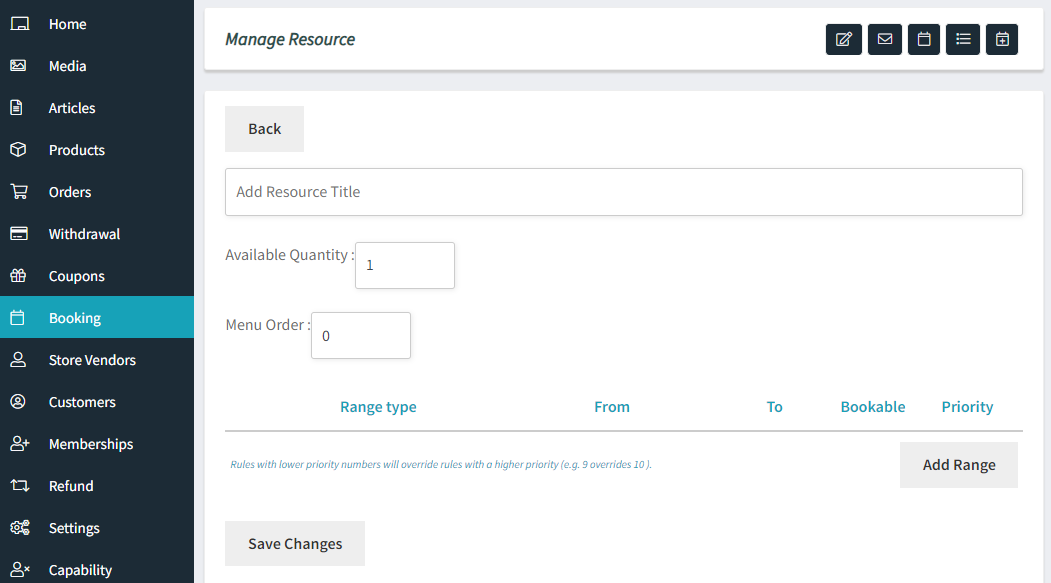
You will find the following values included here:
Add Resource Title: Here you can add the name of the Resource. For instance, you can add in a person’s name here. Let’s go with Apeksha.
Available Quantity: This will let select the number of resource that will be available at any given time. Let us go with 1.
Menu Order: This decides the order in which the resource will appear on the Menu. If you enter 1, the resource will be the first in the list.
Range Type: Here you can select a range for your resource person. For instance, your resource “Apeksha” is available to book only from 15th December 2021 to 20th December 2021. For this, select the “Date Range” type. Different range types such as Range of months, weeks, days, and even Time ranges are available for you. You can learn about them in-depth by referring to our documentation here.
From: This indicates the start period of the range. For instance, you can add 15th December 2021.
To: This is the end period of the range. Here you can add 20th December 2021.
Bookable: To make this range bookable, you will have to select the checkbox. If you haven’t, your booking for this range will be unavailable. For instance, let’s not select the checkbox to block the dates from 15th December to 20th December 2021.
Priority: This will indicate which range of the Resource will get a priority. The range with lower priority numbers will override those with higher priority. For instance, if one range’s priority is set to 9 while the other’s is 10, the one with 9 will be given the first preference.
Add Range: This option will add another range for this resource.
Once you have filled in the details, it will look like this:
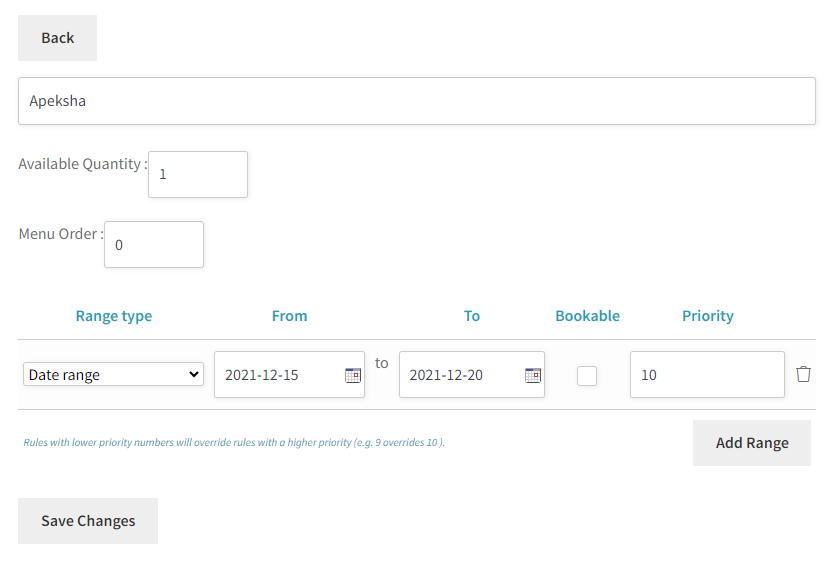
Once you “Save Changes” your resource will be added.
Similarly, you can create different resources and all of them will appear like this under the “Manage Resource” section:
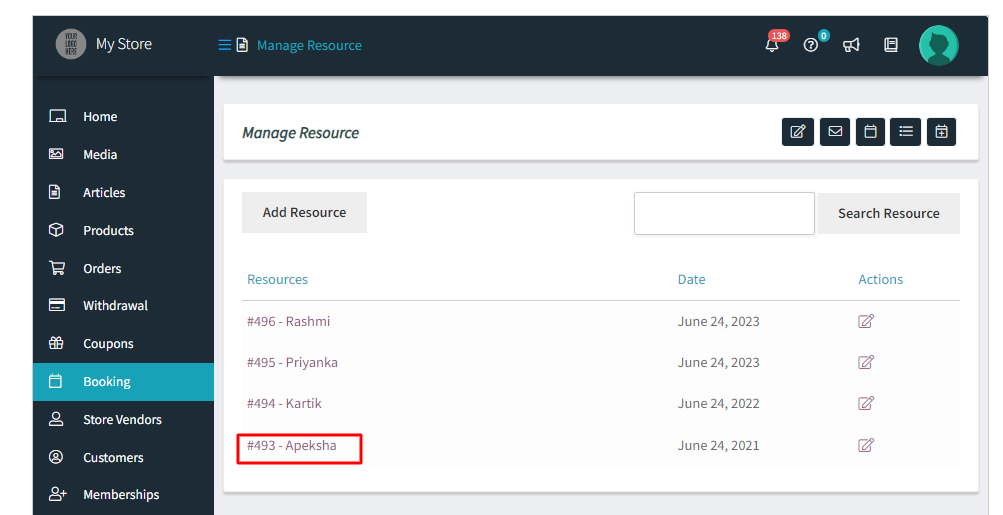
Here you will also find the option to search for a resource. For this, type the resource name in the field and click the “Search Resource” button.
If you wish to edit any resource, click the Edit Resource icons under “Actions”.
Now, go to the Edit Product Page of the booking product where you wish to add your Resource.
Give a name, for instance, “Guitar lessons for beginners”.
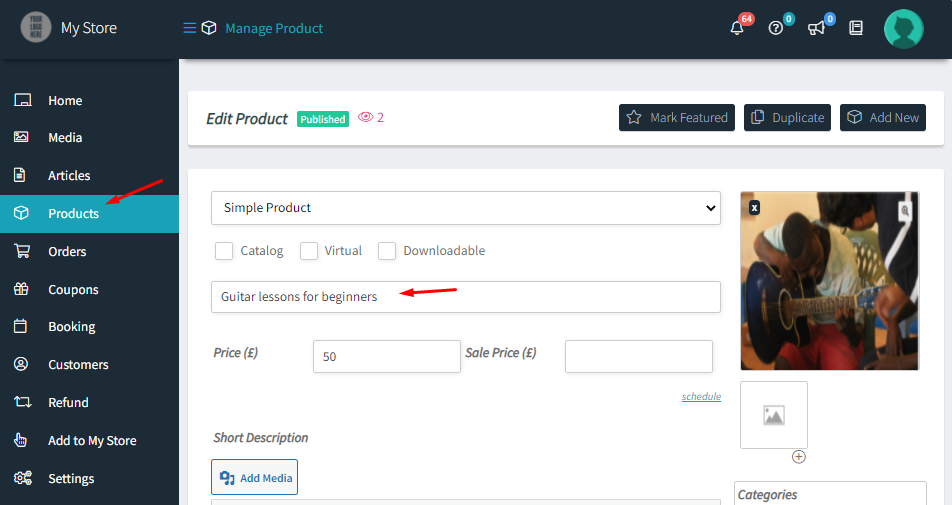
Scroll down to the Booking Metabox. Tick the checkbox for “Booking Resource” as shown here:

A new tab called “Resource” will be visible after doing this.
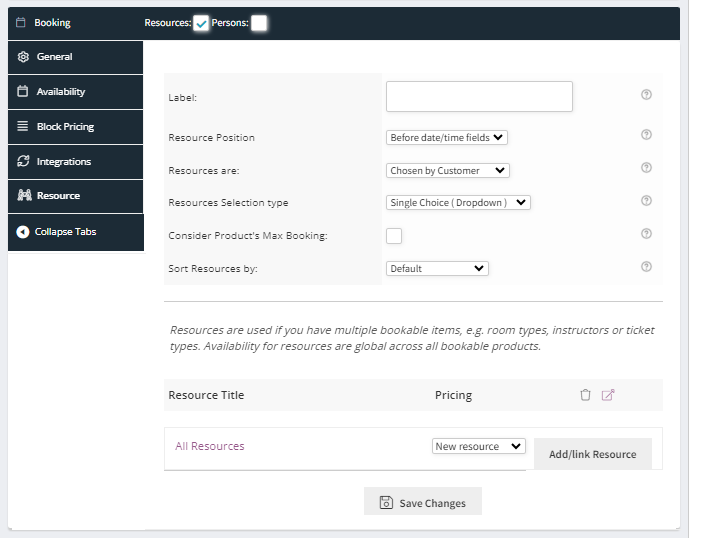
You can now give a label to the resources. For eg, ‘Teacher’.
Configure the other settings by referring to the in-depth documentation here.
Click the dropdown that says ‘New Resource’ and choose the resource to add.
Click the “Add/link Resource” button for this. Once filled, your details will appear like this:
Add the Base Cost of the resource. This means the customer is charged a certain amount for the selected resource alongside the booking amount.
Once done, click the “Save Changes” button and “Submit”.
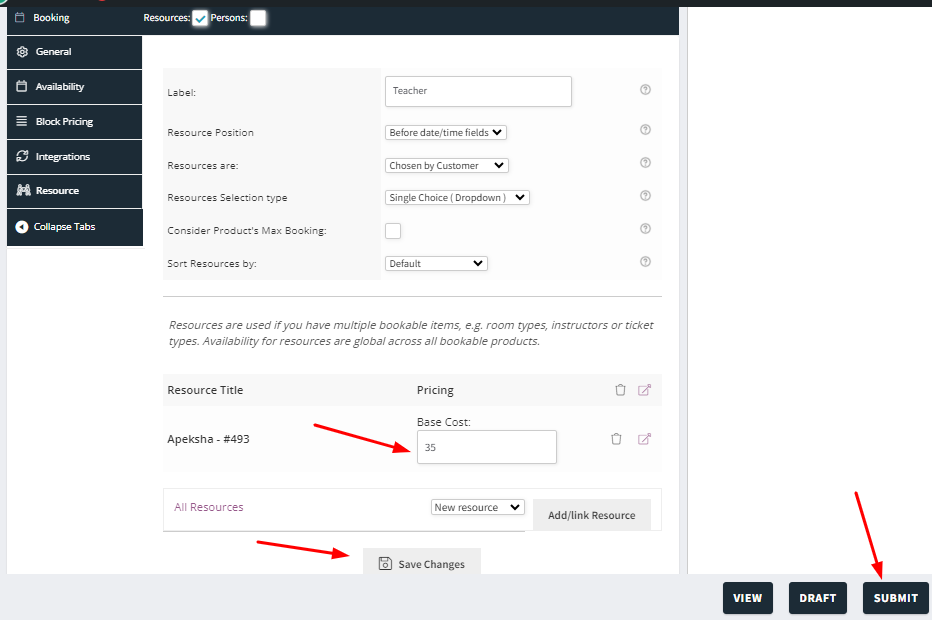
Let’s see how the resource added appears on the front end.
If a customer selects this product, they will get the option to choose the resource they want. Let’s say that they went with the resource Teacher: Apeksha.
Once this resource is selected, only the days when this resource teacher is available will be visible to the customers.
For instance, when they try to choose the booking date, the dates from 15th December to 20th December will not be available since those days are “un-bookable” for this resource.
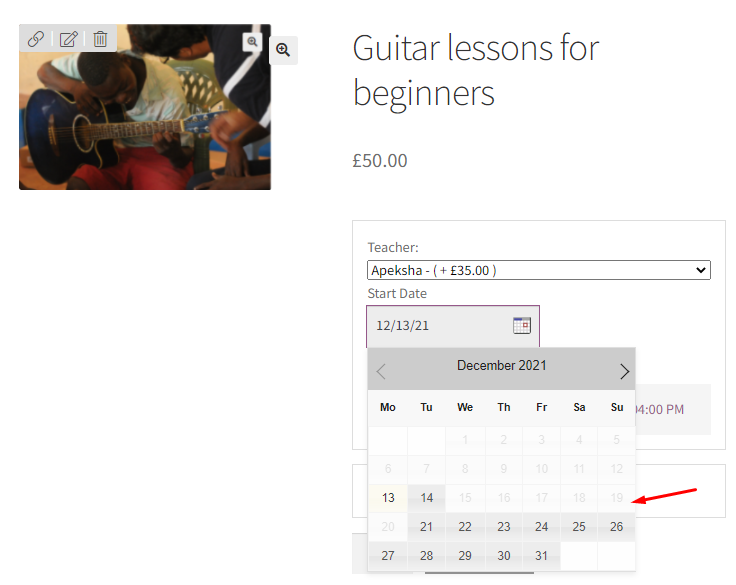
If the customer goes with any other booking dates, then they will get to select the booking time and make a booking!
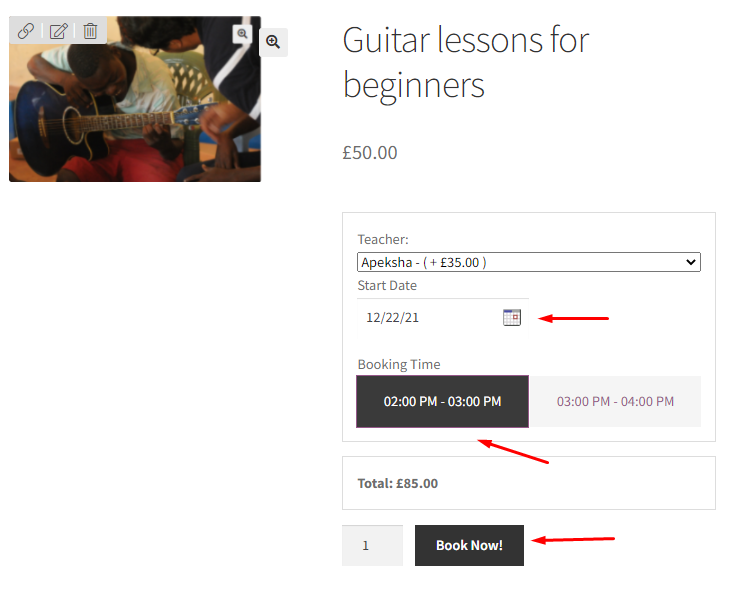
To conclude, WCFM Vendors can easily add resources to their booking products and even manage them with Booking and Appointment Plugin for WooCommerce!
How WCFM Vendors can send Reminder Emails and SMS for bookings
↑ Back to topTo send reminders for bookings, WCFM Vendors have 3 different options.
Let’s see how you can send reminders in these three ways with the Booking and Appointment Plugin for WooCommerce.
First, go to your WCFM Vendor Dashboard > Booking > Send Reminders.
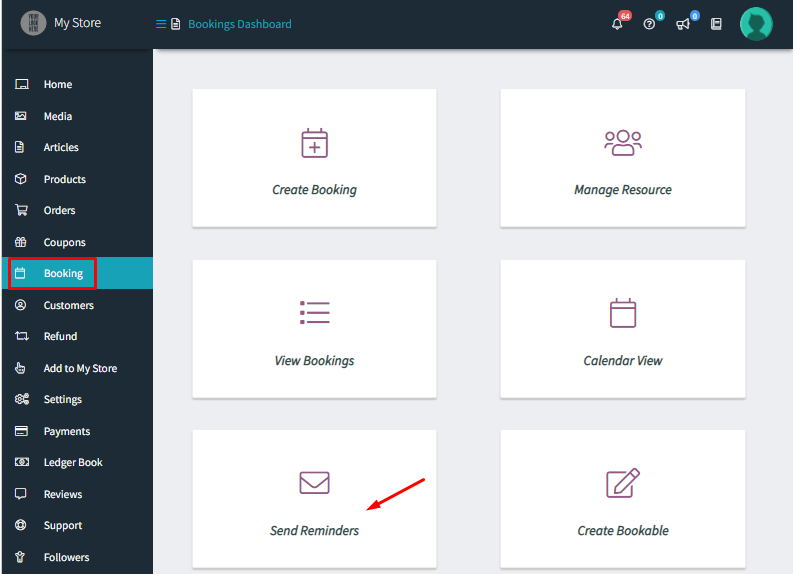
After clicking it, you will get three options. Let’s have a look at them one by one.
1. Adding an Email Reminder
↑ Back to topClick the Add Reminder button as found here:
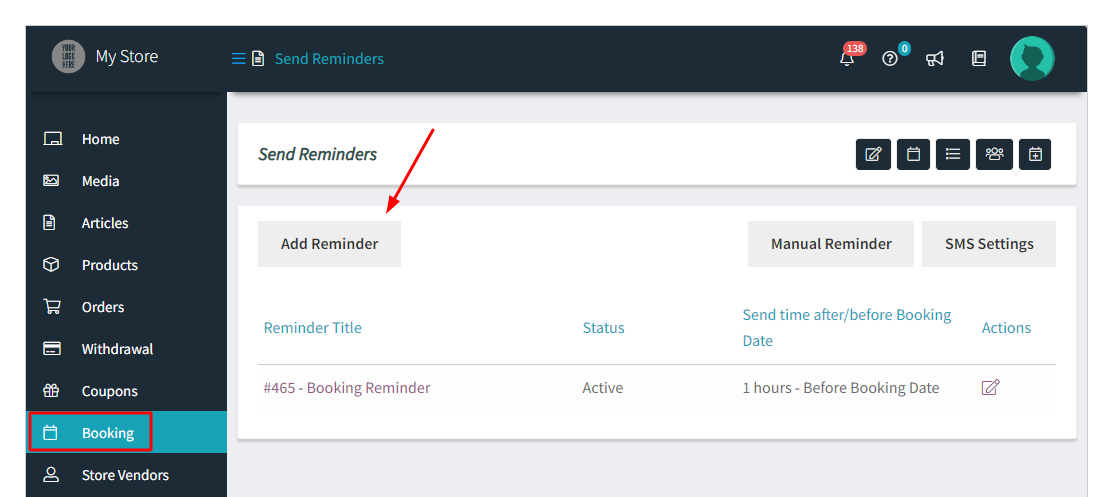
This is how the page will look like:
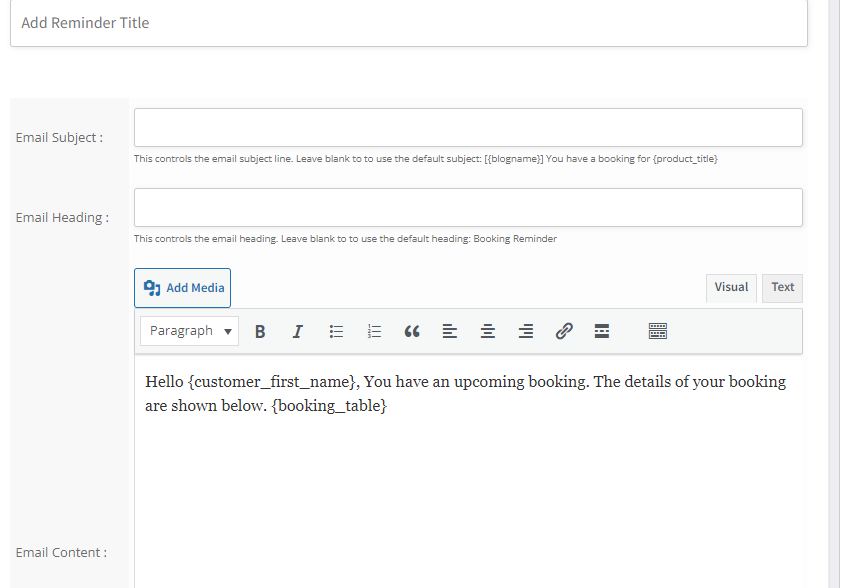
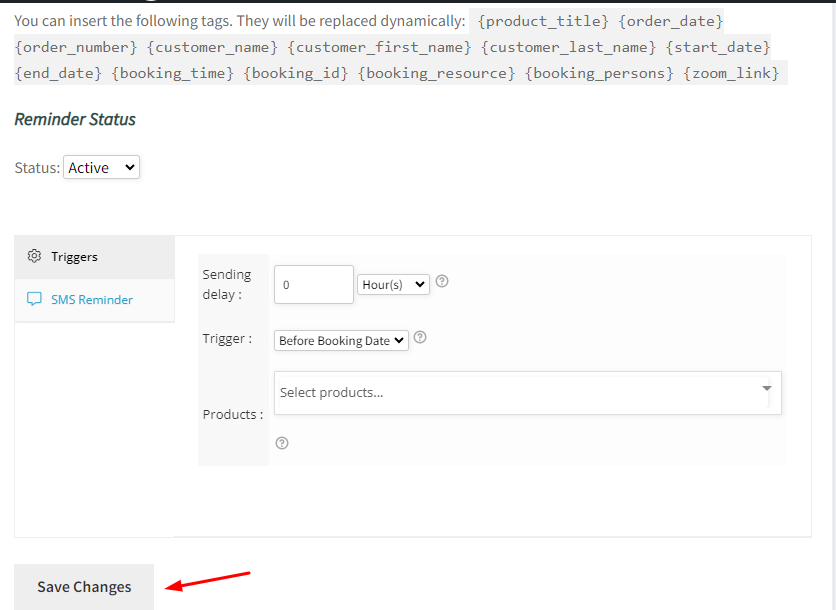
Add the Title, subject, and heading for this email.
You can edit the Email Content using the shortcodes/tags given.
Set the Status of this reminder as Active.
Under Triggers, you will find the following:
Sending Delay decides the time when the email will be sent. For instance, it could be after or before 1 hour, 2 days, 1 month, or even 2 years.
Trigger decides whether the email will be sent before or after booking.
The Products setting lets you choose more than one product for which this email reminder will be sent.
For example, you can enter a delay of 1 hour before the booking date for the product Hotel, the Pierre.
This would mean the customer will receive an automatic reminder email 1 hour before their booking date for the product Hotel, the Pierre.
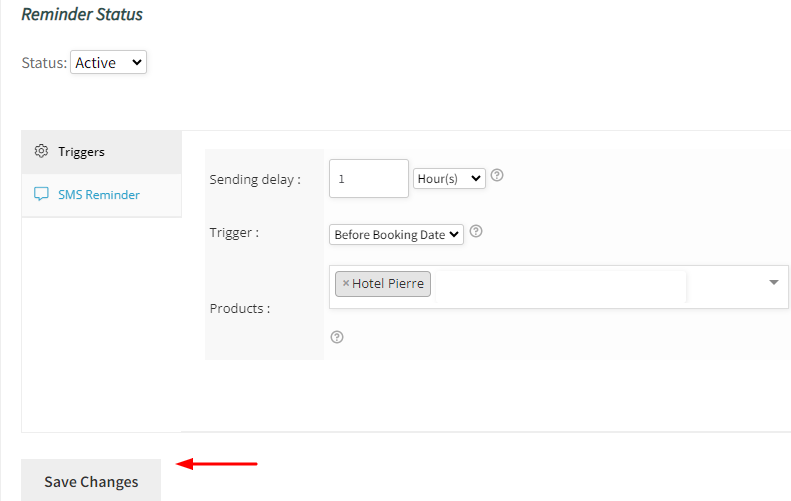
Let’s say a customer has booked Hotel, The Pierre for 24th December 2021 from 1:15 PM to 2:15 PM.
They will receive an automatic reminder email at 12:15 PM on 24th December as shown below:
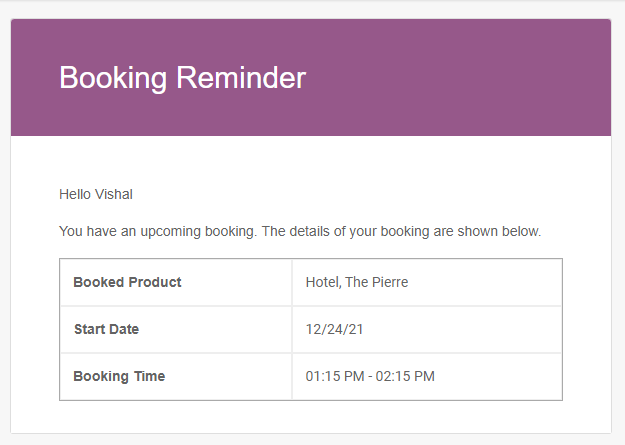
Similarly, you can go to the SMS Reminder tab.
Tick the checkbox for the Send SMS setting.
Edit the SMS Body using the short tags.
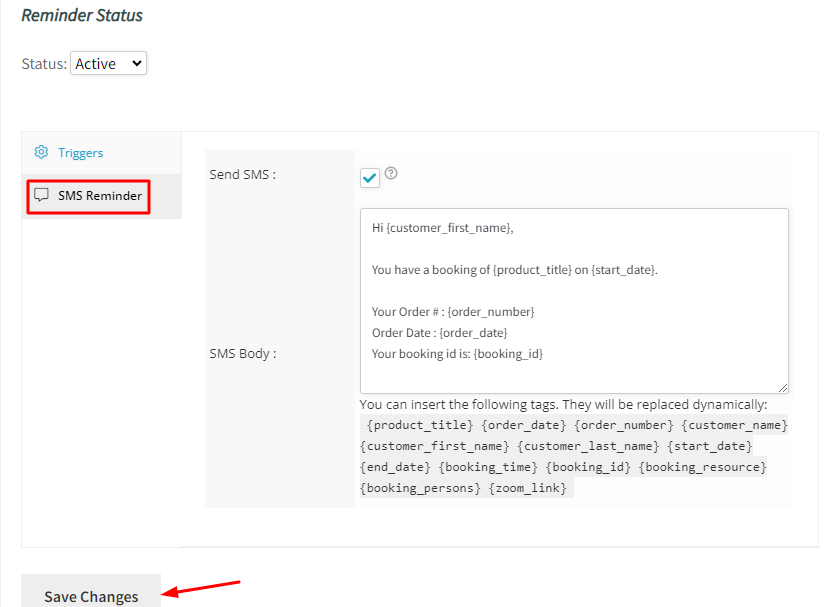
2. Manual Email Reminders
According to this feature, you can manually set up reminder emails.
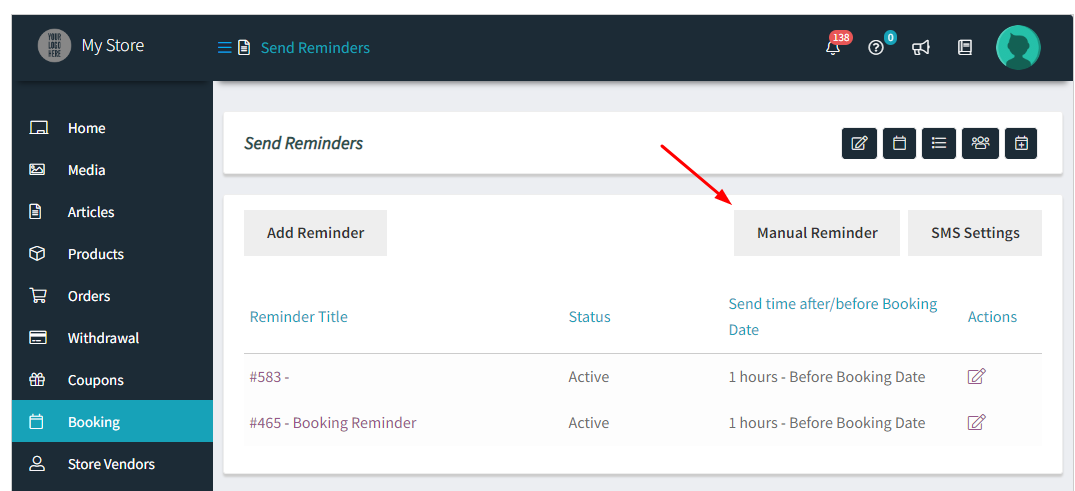
The template used for sending manual reminder emails is the same as the one used for automatic reminders but here you can add more content to the message.
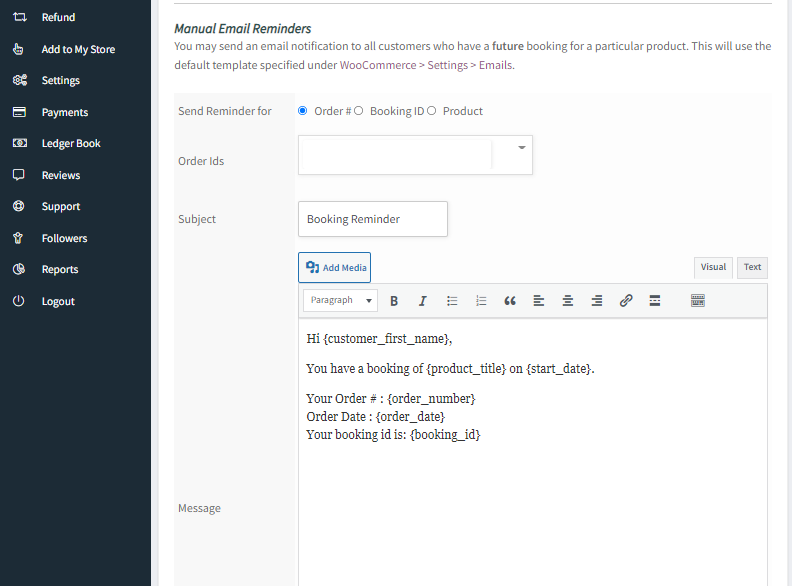
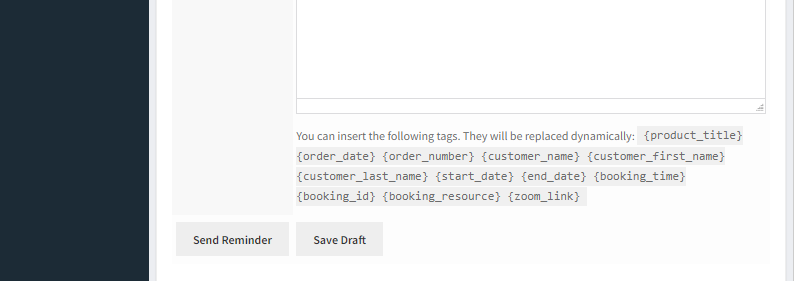
Reminders can be based on specific Order, Booking ID, or Product. This can be done using the respective radio button in Send Reminder for the option.
If you select Order # in the ‘Send Reminder for’ option, you will see the list of Order IDs on clicking the Order IDs field as shown below:
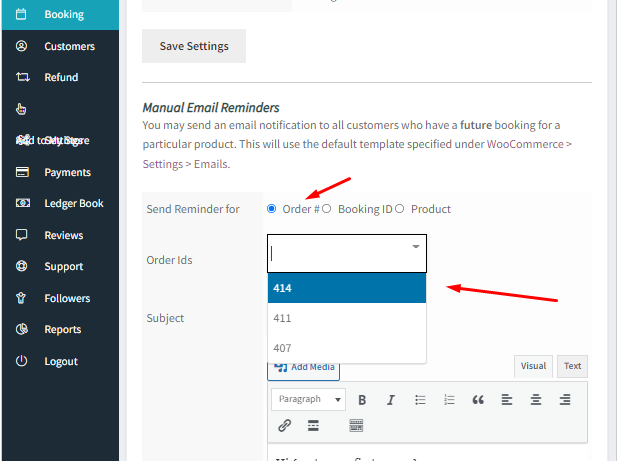
Now select from the list of displayed Order IDs.
You can send the reminder email to multiple Order IDs by selecting them from the dropdown.
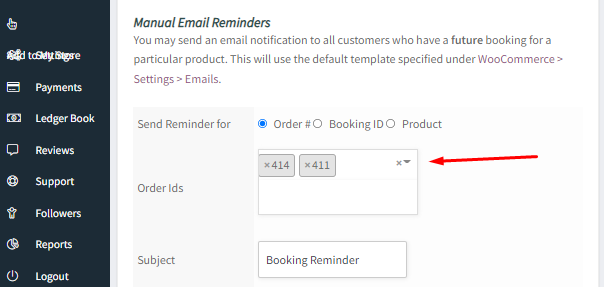
The reminder email will be sent to the selected Order IDs together.
Likewise, you can select the Booking ID to send reminder notifications by selecting the booking IDs from the dropdown as shown below:
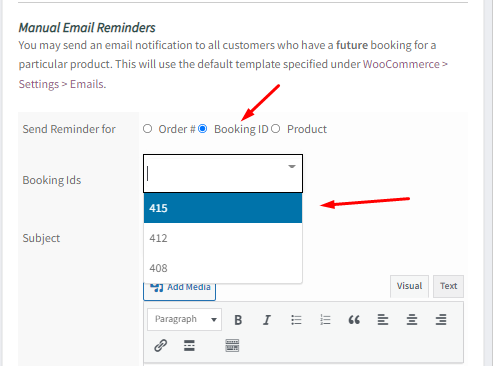
When you select the Product radio button, all the Booked Products will be displayed like Order IDs and Booking IDs.
You can select a single product or multiple products from the list as shown below:
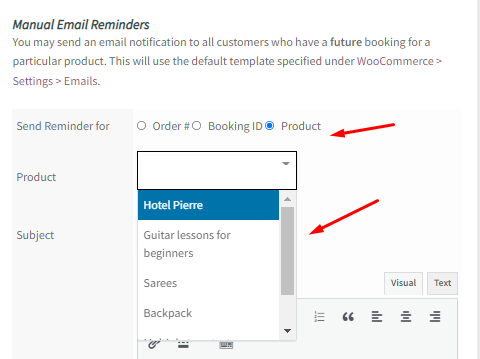
Once you have selected the Order # or Booking ID or Product for sending reminder emails, you can add a Subject and Message to the email.
To understand this better, let’s take an instance. You want to send a reminder email to the customer for their booking for Guitar lessons.
Select product Guitar lessons for beginners, add the Subject as Reminder – Guitar lessons for beginners, and compose a message as shown below:
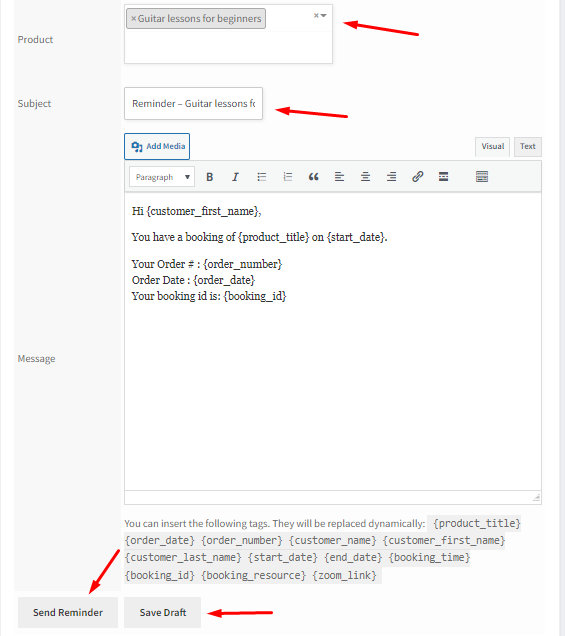
You can click the Save Draft button to save it as a draft and send the email later.
You can even click the Send Reminder button to send the reminder email immediately.
When you click on the Send Reminder button, the email reminder gets sent for all future bookings of Guitar lessons for beginners.
The reminder email sent to the customer will be displayed as shown below:
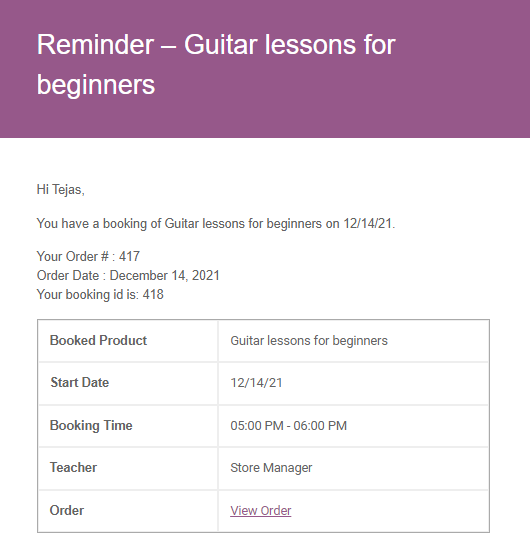
3. SMS Reminders
This setting lets you send SMS Reminders. Select the SMS Settings tab:
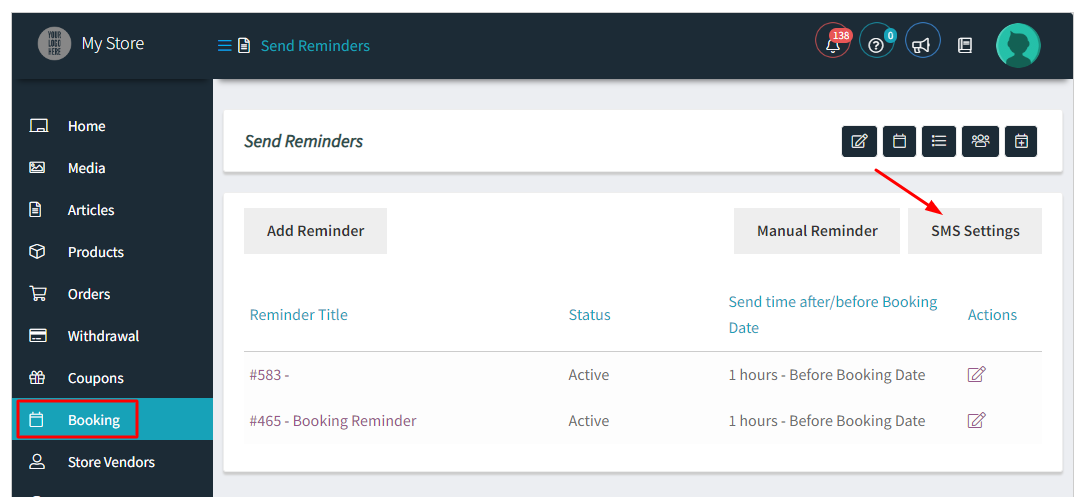
The SMS Reminders page will look like this:
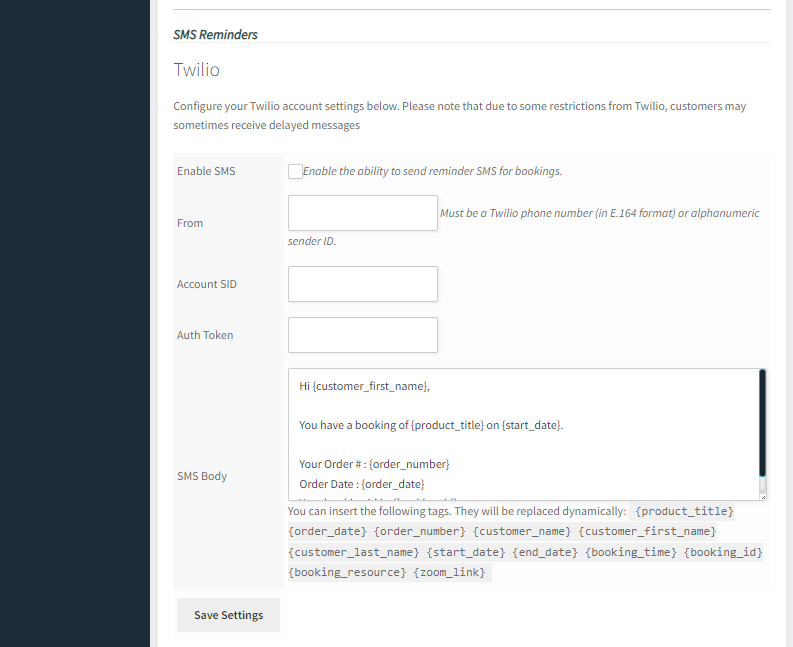
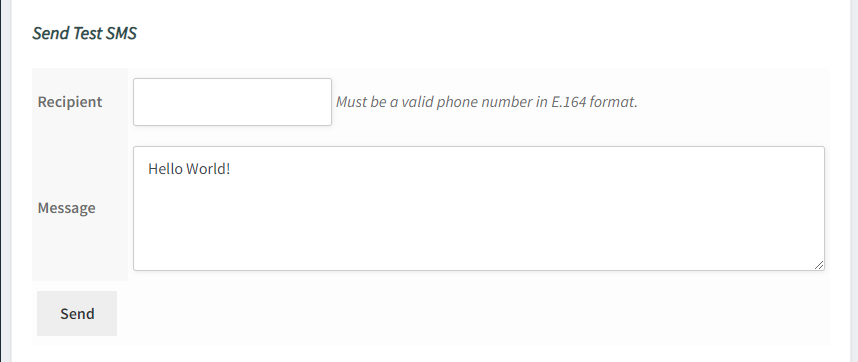
To send SMS booking reminders, you must create a Twilio account.
You will collect your Account SID, Auth Token, and Twilio phone number.
Next, enter all these details after enabling sending reminder SMS by ticking the Enable SMS.
Next, you can make changes to the SMS Body.
There are some shortcodes available that can be used in the SMS body. They will be replaced by the actual information when sending an SMS to the customer.
Once you have filled in the details they will look like this:
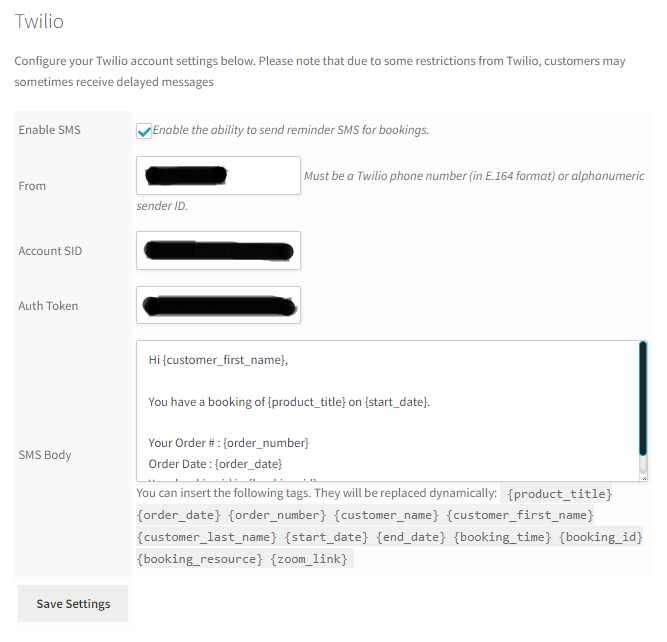
When you’re done, click on the Save Settings button.
Now you will have to add details for sending a Test SMS to the added recipient so that you can check the message before it is sent to the customer.
The phone number in the Recipient field should be valid in the E.164 format.
Clicking the Send button will send an SMS to the number entered in the Recipient field.
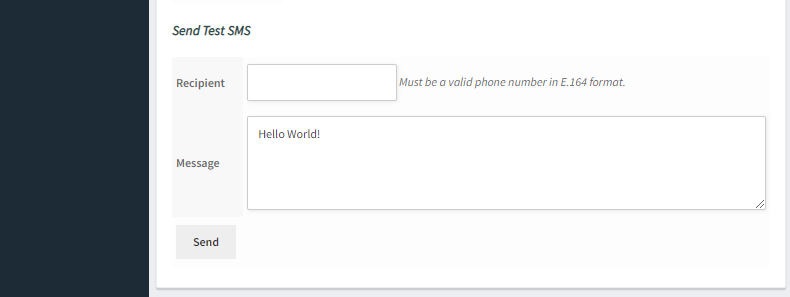
Once done, you can click on the Send button.
For example, let’s say that ‘Guitar lessons for beginners’ booking is set for 14th December 2021.
The SMS reminder will be sent to the customer about their booking with booking details as shown below:
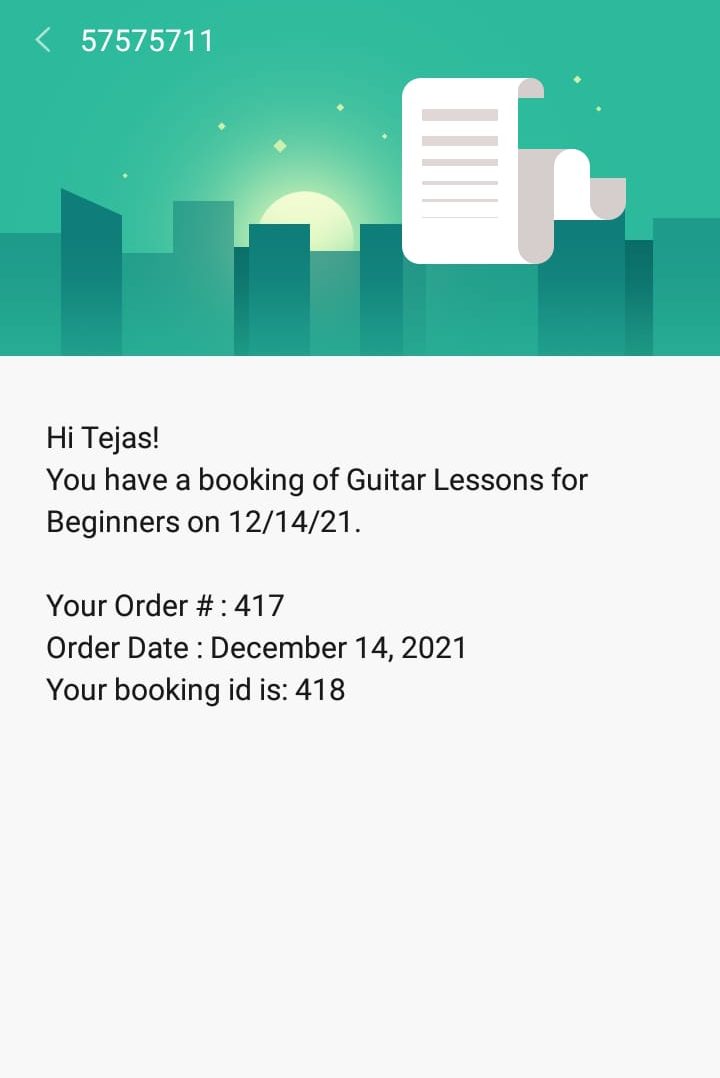
In this way, Vendors can send email and SMS reminders for the bookings automatically or manually!
How WCFM Vendors can create manual bookings
↑ Back to top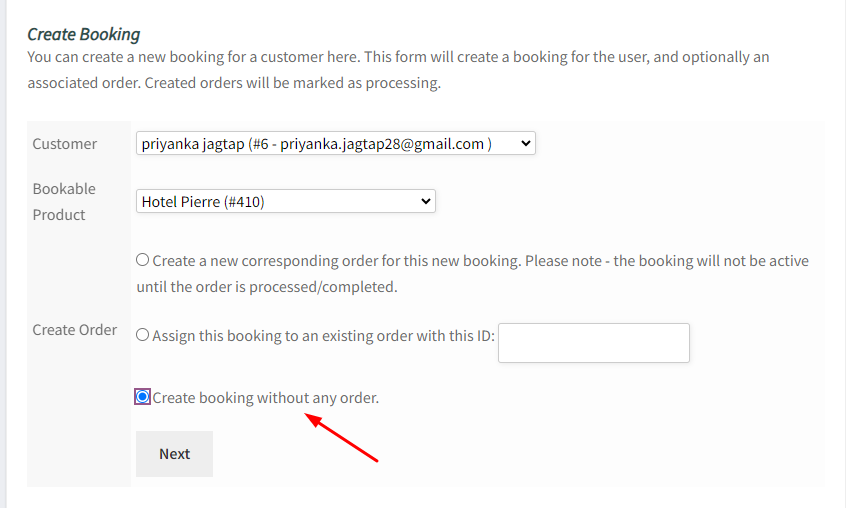
With v5.10.0 of Booking and Appointment Plugin for WooCommerce, WCFM Vendors can now create bookings manually.
So, let’s see how you can configure this!
After logging in to your Vendor account, go to your Dashboard > Booking tab.
Here you can click on the “Create booking” section as shown below:

Once you click on it, the following will appear for you:
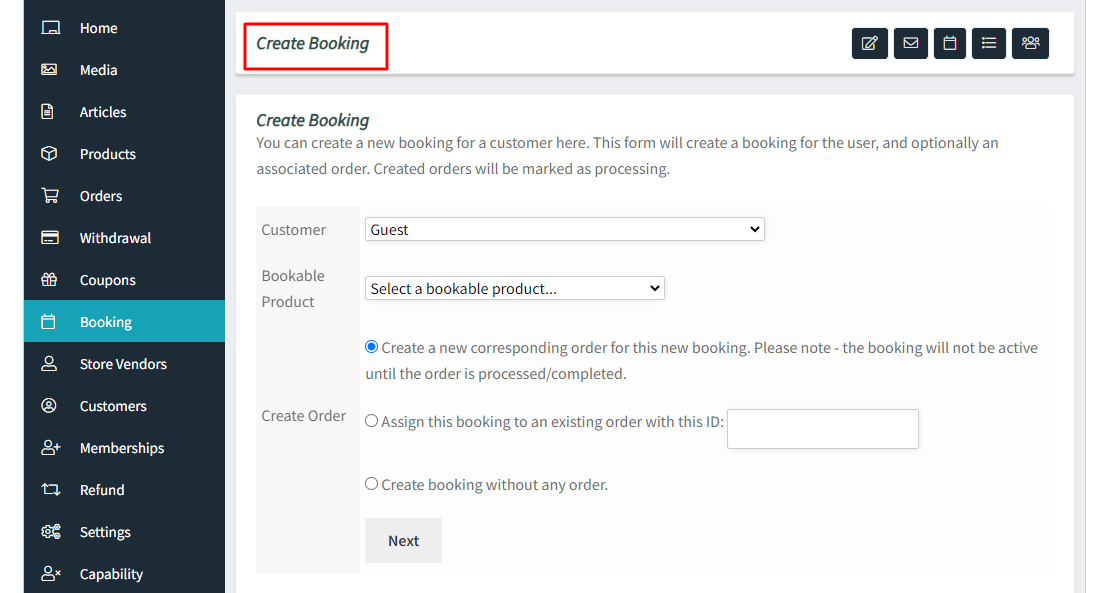
Add the Customer for whom you wish to create this booking.
After this, select the Bookable Product for the manual booking.
Under Create Order, you will get three options:
2. Assign to an existing order
3. Create a Booking without an order
1. Create a New Order
After filling in these details and choosing the create new order option, it will look something like this:
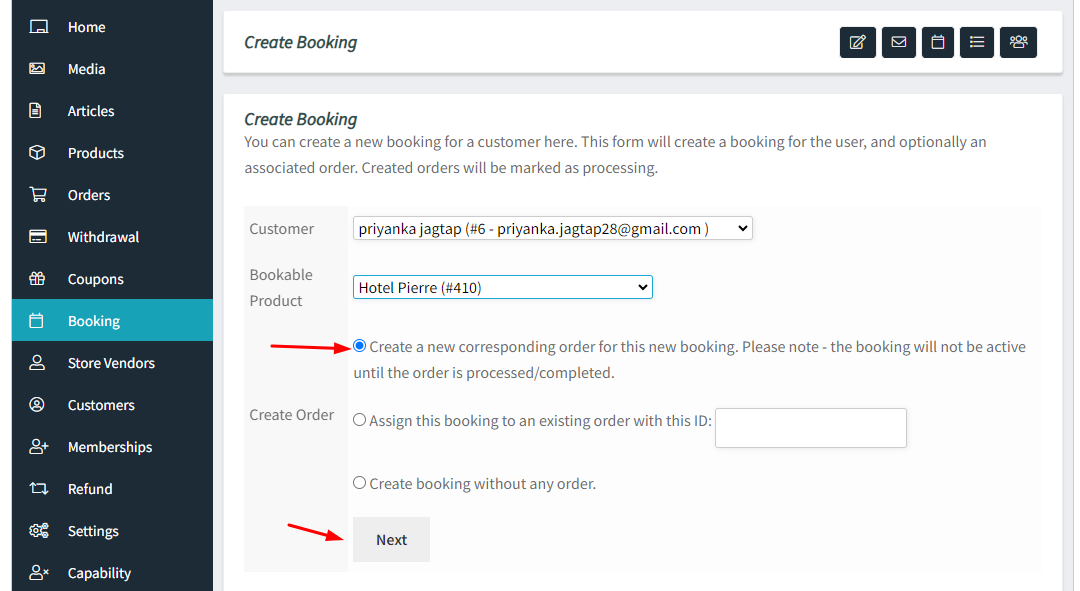
Once done, click the “Next” button which will take you to a page where you can add in your booking date as shown here:

After selecting the booking dates, click the “Create Booking” option. You can even specify how many bookings you wish to create.
For instance, the dates from 16th December 2021 to 18th December 2021 have been chosen. Only one booking is selected in this case:

Your booking’s been created and you will be redirected to the Orders Page.
Here, you will see the newly created manual booking as shown below:

The Order ID for it is #414.
2. Assign Bookings to an Existing Order
Under Create Order, choose “Assign this booking to an existing order with this ID”.
Enter the existing order ID in the blank field.
Let’s go with the new order that was just created. Enter 414 and click on Next.
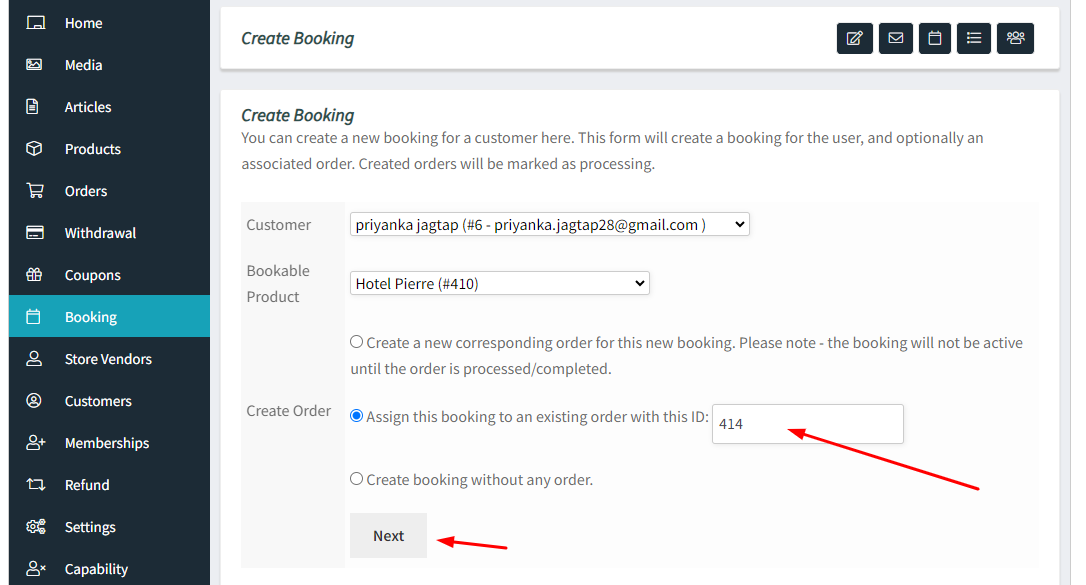
It will now let you choose the start and the end date of this booking.
You can go ahead with 27th December 2021 to 30th December 2021.
Once done, click on the ‘Create Booking’ button.

Thus, this new booking will be added to the existing Order #414 as shown below:


There are 2 bookings in one order.
You can even update the status of this booking by selecting a status and clicking on the Update button.
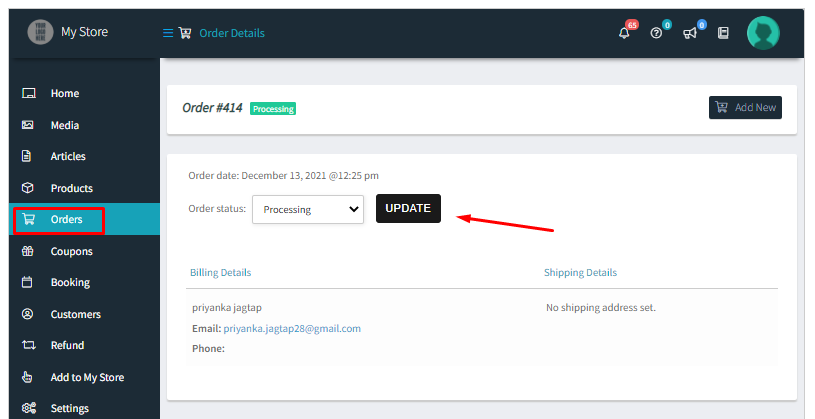
Once you click on it, you should get the following message:
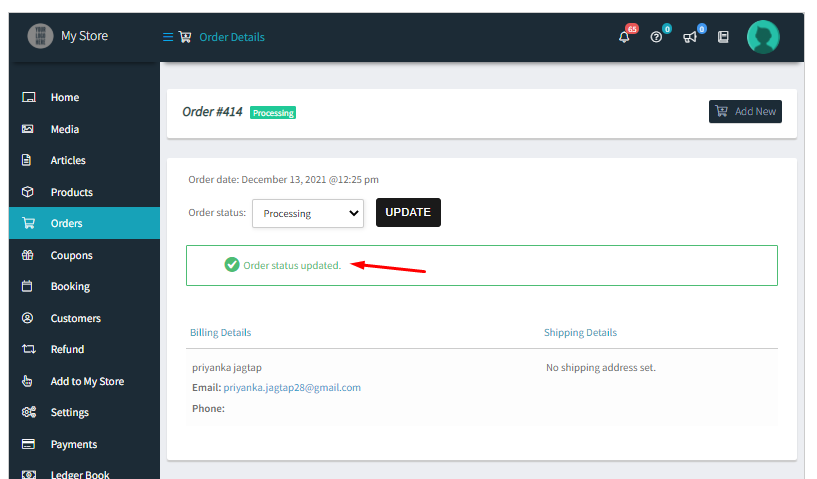
There you go, your manual booking has been created!
3. Create a Booking without any order
↑ Back to topThe last option is creating a booking without an order.
Vendors can choose this option if they have accepted offline bookings and wish to manually create a booking without an order.
They can even use this option to decrease the number of bookings available on a particular day! For instance, the vendor regularly accepts 10 bookings. However, on a particular day, they can accept only 6 online bookings.
In this case, they can create 4 bookings without an order and ensure only 6 bookings are available.
After selecting the customer, bookable product, and the create order option, you must click the Next button.
It will take you to the booking page.
After entering the details, click the ‘Create Booking’ button.
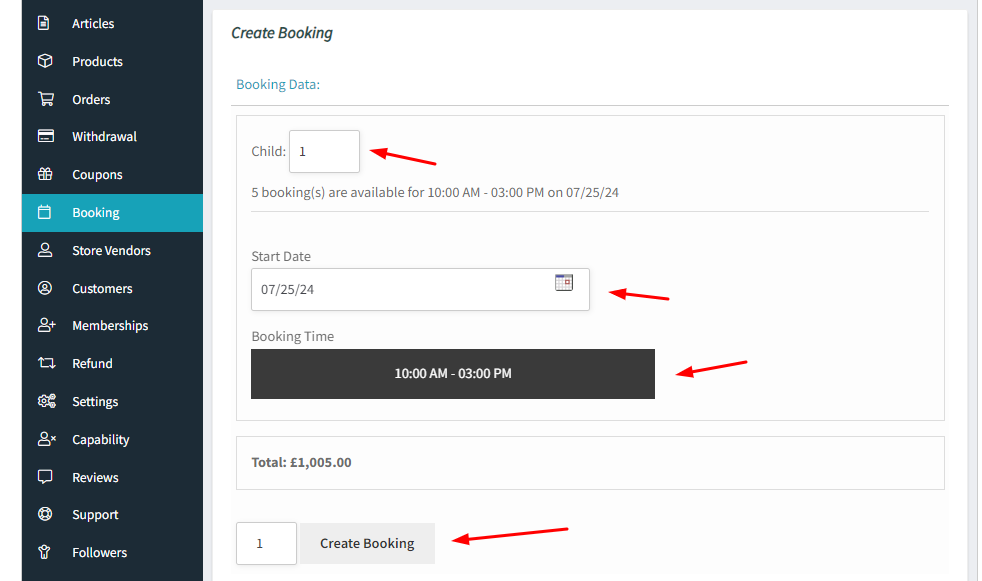
It will take you to the Booking > Create Booking Page. The following message will be displayed:

When you go to the Booking > View Bookings page, the new booking without an order will be displayed:
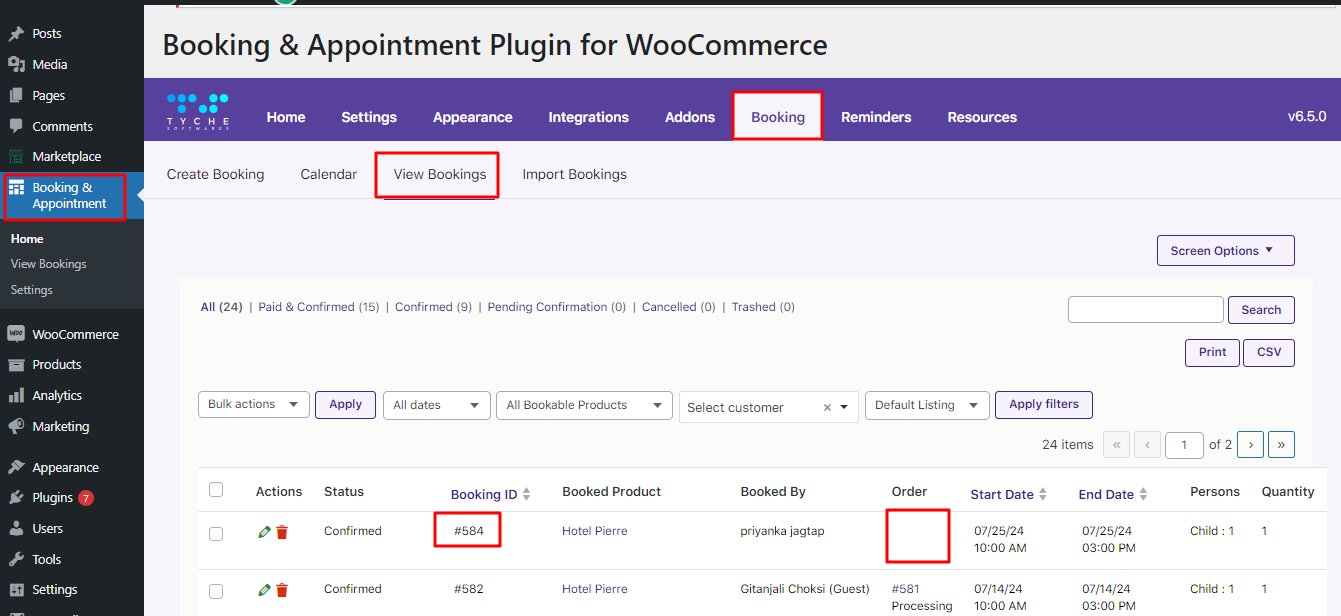
Using these 3 options, Vendors can easily create manual bookings according to their requirements!
